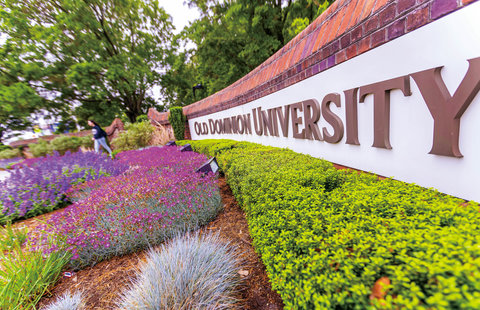Old Dominion University offers a Bachelor of Science degree in interdisciplinary studies with a major in cybercrime. The cybercrime major prepares students for occupations in law enforcement and information technology. Students in the cybercrime program will be required to developed strong written and verbal communication skills, as well as skills in mathematics and logic. Students will take courses in criminology, cybersecurity, and information technology. Through these courses they will learn about technology-related criminal justice issues, including cyberlaws and computer crime investigations. They will also acquire the technical skills that employers ask for, including knowledge of cybersecurity, digital forensics, computer networking, and common programming languages like Java and C+.
Program Highlights
-
Students have the flexibility to tailor their learning to their unique interests by double majoring in cybersecurity, information technology or criminal justice.
-
Students complete for-credit internships and gain real world experience.
Careers
Check out these ideas from ODU's Center for Career & Leadership Development and the Occupational Information Network (O*NET). A median salary is a midpoint of what people typically earn—half of those surveyed earned above the median salary, and half earned below.
Investigate alleged or suspected criminal violations of Federal, state, or local laws to determine if evidence is sufficient to recommend prosecution.
Gather, analyze, or evaluate information from a variety of sources, such as law enforcement databases, surveillance, intelligence networks or geographic information systems. Use intelligence data to anticipate and prevent organized crime activities, such as terrorism.
Provide technical assistance to computer users. Answer questions or resolve computer problems for clients in person, or via telephone or electronically. May provide assistance concerning the use of computer hardware and software, including printing, installation, word processing, electronic mail, and operating systems.
Collect, identify, classify, and analyze physical evidence related to criminal investigations. Perform tests on weapons or substances, such as fiber, hair, and tissue to determine significance to investigation. May testify as expert witnesses on evidence or crime laboratory techniques. May serve as specialists in area of expertise, such as ballistics, fingerprinting, handwriting, or biochemistry.
Requirements
-
Students must develop strong math skills. Most classes in the technology portion of the major require Math 102M (College Algebra) and many require MATH 162M (Precalculus I).
Transfer
At ODU, we understand that as a transfer student you have unique needs that require a wide array of campus resources. The Center for Advising Administration and Academic Partnerships aims to create a transfer inclusive culture that supports the successful...
Cost
Estimated rates for the 2025-26 academic year. Rates are subject to change. Other fees are assessed for special services and certain academic programs. Anyone that is not a current Virginia resident will be charged non-resident rates. That includes international students.
Ways to Save
Here are a few ways for you to save on the cost of attending ODU. For more information visit University Student Financial Aid.
Contact








